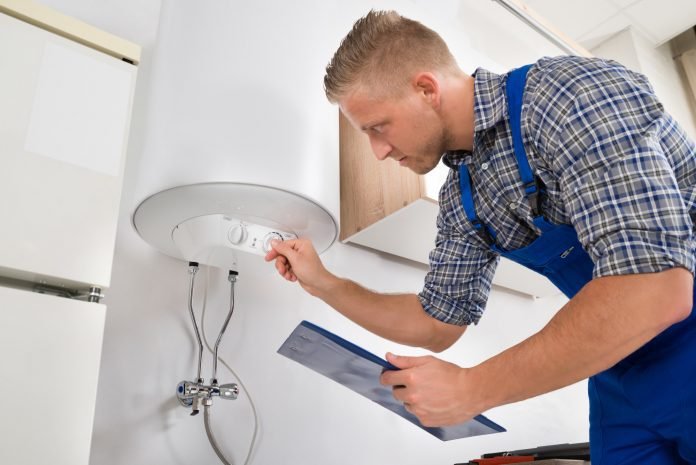Last Updated on March 10, 2025 by Bisma Sehar
After you own your home for a while, it’s inevitable that you’ll start thinking about home improvement or renovation projects, like a new kitchen. It’s a way for you to improve the usability of your home and maybe upgrade appliances.
Of course, it’s easy to think about upgrading appliances you see every day. What appliance you don’t see every day, like your hot water heater? In most homes, those get tucked away and drop out of mind until a disaster tells you that you need a new water heater.
If you want to stay ahead of the curve with your hot water heater, keep reading. We’ll give you seven signs that your water heater is up for a replacement.
Table of Contents
1. Age
Much like your other appliances, your hot water heater has a finite working life. For most water heaters, you can expect anywhere from 8 years on up to 12 years of reliable function. Once your water heater reaches a decade, though, it’s time for you to start looking for a water heater replacement at a home improvement store or a site like Qbicheating.co.uk.
You do have some options, but you’ll want a water heater with at least as much capacity as the one you already have in your home. That ensures you won’t suddenly find yourself running out of hot water when you never used to have a problem with it.
2. Constant Repairs
The first few times you see trouble, water heater repair makes sense. After all, why buy a whole new appliance if an HVAC company can come out and fix it for a lot less.
If you find that you’re making a call like that every couple of months, though, that’s a different story. It means that your hot water heater is on its last legs. Parts will keep failing on it.
At that point, you’ll end up saving money in the long run if you have a water heater company install you a new one.
3. Odd Sounds
As a general rule, your water heater should operate at or near silence. After all, it’s primarily a heating coil or burner and a big pot. It should never get anywhere near water’s boiling point, so there’s no reason it should many any significant noise.
However, sediment will build up in your water heater over time. As that sediment builds up, it can bump against the tank’s interior wall. That gives you an odd banging or clunking sound.
The good news is that, if you catch it early, you can drain the tank. Most of the sediment will typically go out with the draining water.
At the very least, you should get a professional out to look at your hot water heater if you hear strange noises from it.
4. Temperature Varies
A new hot water heater will heat water to whatever temperature you set the thermostat and keep it there. Most hot water heater tanks come with a specific R-value. That’s essentially a rating about how well it insulates what’s in the tank.
In practical terms, that means that the tank helps keep the water temperature stable. If you get variable temperatures, it’s a key sign that there is a problem with your tank or the heater.
For example, the heating element may not function properly anymore. It could also mean that your thermostat is failing. These are both repairable problems for most hot water heaters.
If those solutions don’t fix the problem, though, it likely means you need a new tank.
5. Life Changes
Very few people live a static lifestyle. For example, you may get married or have kids. Maybe you young kids are now teenagers.
All of these changes can put all sorts of new demands on your hot water heater. You have more laundry to do. More people are taking showers or taking them more often.
This can mean that your old hot water heater just can’t hold enough water to meet the current demands. It’s not a problem with how it functions, but rather with your changing needs. If you constantly run out of hot water, you may just need a bigger hot water heater.
6. Discolored Water
One of the problems with water heaters is that many of them will eventually start to corrode inside. Once that happens, it can leave you with discolored water.
It might just look cloudy. It may also look rust-colored.
Before you head down to the store to find a new hot water heater, do a little test. Run the cold water tap for a little while. Does that water share the same cloudiness or discoloration? If so, you’ll likely find the problem with your pipes.
If that water runs clear, it means the problem is with your hot water heater. Cloudiness in your water may just mean you have sediment in the tank and draining the tank may well clear it up.
Rust-colored water is almost always a sign of corrosion. That typically calls for a replacement.
7. Leaking
Any time you see signs of leaking around your water heater, it’s a problem that needs attention in the immediate future. In the best-case scenario, it’s a problem that a plumber can repair. For example, maybe a connection has come loose and they can tighten or seal it.
If they can’t fix it, though, you should plan on getting yourself a replacement unit. Like so many other problems around the house, it’s not something that will go away if you wait.
A New Water Heater and You
Most homeowners don’t like replacing appliances like hot water heaters. There isn’t any value-add for your home with a new water heater. It’s not even fun to show off.
Even so, there are plenty of signs that will warn you that you’ll need one. Age, repairs, and strange noises are routine but reliable signs that your hot water heater is likely dying. Signs like temperature problems, running out of hot water, discoloration, and leaks all call for professional attention and possible replacement.
Looking for more home improvement tips? Check out the posts in our Lifestyle section.
Read more: Frequent Problems With Old & New Water Heating System | Solutions
















